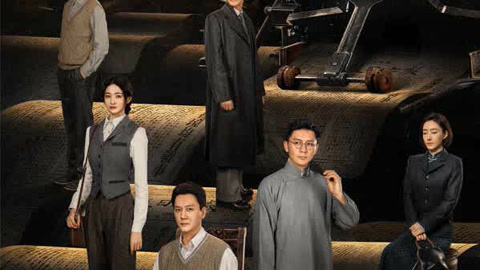Episode Summary
The episode sets the stage in 1930s China, a country torn by internal conflict and facing Japanese invasion. The Communist Party, led by Mao Zedong and Zhou Enlai, decides to push for a united front with the ruling Nationalist Party (KMT) to resist Japan. While the KMT leader, Chiang Kai-shek, hesitates, the Communists begin their own efforts. They recruit the writer Xia Yan to run a propaganda newspaper, the "Salvation Daily," and help another influential writer, Guo Moruo, return to the country. Just as student activists begin to spread the message of resistance, the war arrives in Shanghai with a sudden and devastating air raid.
Spoiler Alert
Alright, let's get into the first episode. It drops us right into a tense moment in Chinese history. The year is 1931. Japan has just invaded Northeast China. The Nationalist government, led by the Kuomintang (KMT), isn't putting up much of a fight. So, the region falls fast. This obviously makes a lot of people angry.
Flash forward to 1935 in Shanghai. We meet some members of the rival Communist Party. Xia Yan and Nie Er are listening to a brand new song. It's called the "March of the Volunteers." The song is powerful. You can see it hits them hard. They know it's exactly what people need to hear. The country is a mess. The KMT is more focused on fighting the Communists than the Japanese invaders. This has led to a civil war. Regular people are caught in the middle. This song is meant to be a wake-up call.
A Tale of Two Parties
The Communists Change Strategy
The show then takes us to the Wayaobao Conference. Here, we see the Communist leadership, including Mao Zedong and Zhou Enlai. They're hashing out a new plan. They decide to shift their focus. The new goal is to unite everyone—workers, farmers, everyone—to fight Japan. They want to build a new united front.
Mao argues that fighting Japan has to be the top priority. It's the only way to change China's situation. So, they reach out to their enemy. The Communist Party sends a formal letter to the KMT leader, Chiang Kai-shek. The letter proposes they stop fighting each other. It asks them to join forces against the Japanese. But Chiang is suspicious. He says he needs to think about it.
The Nationalists Hold a Grudge
You really see the difference between the two sides with this next bit. A famous writer named Guo Moruo wants to return to China from Japan. The Nationalists get the news, but Chiang Kai-shek immediately shuts it down. Why? Because Guo once wrote an article criticizing him. Chiang is still holding a grudge years later. He couldn't care less about Guo's return.
The Communists have the opposite reaction. They're thrilled. They see Guo Moruo as a major cultural figure. They believe his writing can inspire the nation, much like the late writer Lu Xun did. They decide it's essential to help him get back home safely.
A Secret Mission in Shanghai
The story jumps back to Xia Yan in Shanghai. It's late at night. The city is dangerous for Communists. The KMT's secret police are everywhere. This period was known as the White Terror. Xia Yan gets a mysterious phone call. A voice tells him to come downstairs immediately.
He knows it's a huge risk. But he goes anyway. He meets a progressive journalist named An E. She tells him to get in her car. After a long, tense drive, they arrive at a secret location. And there, Xia Yan meets the man he's been waiting to see. It's Zhou Enlai.
Zhou has a mission for him. The party wants Xia Yan to become the editor-in-chief of a new newspaper. It will be called the "Salvation Daily." Xia Yan is a poet who despises the Japanese invaders. He accepts the job without hesitation. His first task is to go to the docks and personally greet Guo Moruo upon his return.
The War of Words Begins
With Guo Moruo back, the plan is set in motion. Zhou Enlai meets with him. They agree to use the "Salvation Daily" as their main weapon in a propaganda war. The paper will spread the call for national resistance. Its articles quickly start countering Japanese claims that they can conquer China in three months. Newsboys run through the streets, delivering the latest updates. The anti-Japanese movement starts to grow.
We also meet a group of passionate students. One of them, Han Dayong, is giving a speech at his school. He's trying to rally his classmates. He reads from a powerful article that perfectly captures their feelings. Suddenly, a girl in the crowd named Ren Suning speaks up. She wrote the article.
Han Dayong is impressed. He immediately asks her to join their student newspaper group. She happily agrees. But just as they're celebrating this new connection, the sound of airplane engines fills the air. Before anyone can react, bombs start falling. Buildings explode and crumble to the ground. The episode ends with chaos and destruction as the city goes up in flames.


